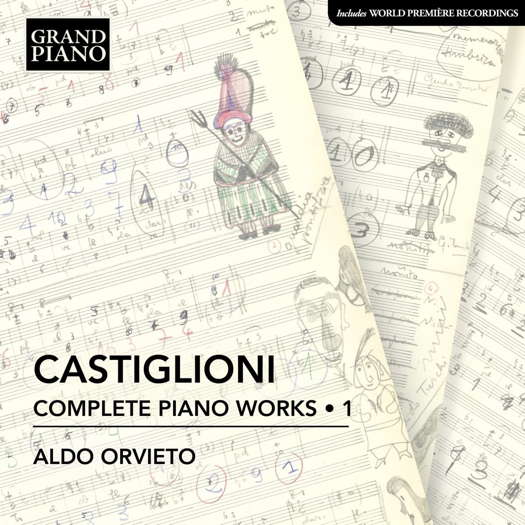 ASK ALICE: Weekly, from 2003 until 2016/17, Alice McVeigh took on the role of classical music's agony aunt to answer questions on a surprising variety of subjects.
ASK ALICE: Weekly, from 2003 until 2016/17, Alice McVeigh took on the role of classical music's agony aunt to answer questions on a surprising variety of subjects.

Simplicity and Innocence
ROBERT McCARNEY listens to volume one of the complete piano music of Niccolò Castiglioni
'Aldo Orvieto ... definitely has the measure of Castiglioni's unique universe and does this music proud.'
Many moons ago when I lived in Italy, living in the apartment across the hall from mine was a young man who had the exceedingly frustrating habit of repeatedly shouting at somebody or something most nights. On the numerous occasions I knocked on his door in order to explain my frustration and ask him to stop, he refused to open. Mercifully a month or two after I had moved in he moved out and a very pleasant and extremely quiet couple moved into his place. In the time before he left in a bid to get my message across I had pinned a sheet of paper to the outside of the door of my apartment with the words. Il rumore non fa bene, il bene non fa rumore. In English this (after losing most of its palindromic poetry in Italian) means 'Noise doesn't do you any good, what's good doesn't make any noise'. Words I would be happy to see on my grave.
I took these words from one of the greatest pieces of music composed in the last half century, namely Inverno - In Ver by Niccolò Castiglioni. This same piece was also the cause of my fondest ever Proms memory when I was lucky enough to hear the late Oliver Knussen conduct it in 2011. If I say that Castiglioni was for me a kind of musical monk, obsessed with purity, clarity, silence and a superficial simulacrum of simplicity that was anything but simple in its construction or conception, you may well think of another great twentieth century Italian maverick: Giacinto Scelsi, and you would not be wrong to do so. It says everything about Scelsi and Castiglioni that their music sounds nothing like each other's or like anybody else's for that matter. And while they both very often used minimal means their music has nothing to do with the mind-numbing strand of minimalism.
Although quite a bit of Castiglioni's music has been commercially recorded there is still a lot that hasn't and this present CD contains no less than five world premières. That comes with the caveat that some of these compositions have never been published. Castiglioni was an extremely talented and accomplished pianist in his own right. After he completed his studies he regularly performed in public and played some exceptionally demanding repertoire but with the passing of the years he concentrated more and more on composition and less on performance. Even knowing that Castiglioni as a young man was devoted to Stravinsky the first piece here, the Piano Sonatina in G composed in 1952, comes as quite a shock.
Listen — Castiglioni: Allegretto (Piano Sonatina in G)
(GP862 track 1, 0:00-0:58) ℗ 2022 HMH International Ltd :
It is not so much neoclassical as purely classical as it reminds one of Scarlatti or Haydn, the middle movement has a touch of Satie about it. On closer reflection one can already notice the clarity of form, transparency of detail and rejection of anything superfluous that would characterise all of his output. Added to this is his attraction to epigrammatic statements and the simplicity and innocence of the world of childhood which is already evidenced in the Piccola Suite from the same year.
Listen — Castiglioni: Melodia (Piccola Suite)
(GP862 track 10, 0:00-0:23) ℗ 2022 HMH International Ltd :
Coming of age as he did in the 1950s, Castiglioni could not avoid having to deal with Webern and serialism in some form or other, whether that meant rejecting or accepting it. Like everything regarding Castiglioni his take was unique. He did both and neither. His Quattro Canti of 1954 give the lie to the idea that music composed using serial means has to sound a particular way. His serial treatment of the compositional material is taken further in Momento Musicale which he composed in the same year.
Listen — Castiglioni: Intermezzo (Quattro Canti)
(GP862 track 13, 0:50-1:11) ℗ 2022 HMH International Ltd :
The highlight of this disc, and a piece which has been recorded before, is Come io passo l'Estate (how I spend the summer). The subtitle, 'suite for beginners', and indeed the cover of the score, designed by Castiglioni himself, in pastel shades give the idea of pure simplicity which is never the case with this composer. The piece was inspired by his love of the South Tyrol, particularly the Val di Tires. Castiglioni spent a lot of time in Brixen/Bressanone. As a lover of the German language he always used the name of the town in its German form. This whole region (Italy's northernmost) perfectly shows just how artificial, arbitrary and absurd the ideas of borders and nations can be, as Brixen is an Italian town where most people don't speak Italian but German. I first heard Thomas Adès play these pieces a long time ago and was immediately captivated.
The suite is filled with childlike innocence but always through the prism of an adult's reflective mind and emotions, not to forget the musical mastery of a composer now in his fifties. It also contains examples of Castiglioni's remarkably refined responses to the subtle magic of the natural world, particularly his beloved winter with its crystalline textures, sharp air and clarity of vision. Added to this is his sense of sound as a physical presence, as a natural phenomenon: all central characteristics of Castiglioni's compositional craft. Not forgetting his particular sense of humour either.
Listen — Castiglioni: Ghiaccio sul Rosengarten (Come io passo l'Estate)
(GP862 track 26, 0:00-0:23) ℗ 2022 HMH International Ltd :
As he aged his way of life did indeed become more and more like that of a monk and he continued to pare down his music. In his five movement work from 1989 In Principio era la Danza - a very Castiglionian take on Christianity - the longest movement lasts a mere thirty three seconds and the shortest only six. Indeed not a single piece on this CD reaches four minutes. His Webernesque love of the minutiae of the natural world is also evidenced here with pieces called Song of the Caterpillar and Song of the Butterfly. One of my favourite late pieces of Castiglioni's, The Deer in the Forest, has its source in the same vein of inspiration. For a composer so attuned to the richness of life that could be experienced in a single attentive breath, it is very sad that he passed away one night due to lack of breath at the mere age of sixty-four.
Listen — Castiglioni: Largo (Das reh in wald)
(GP862 track 34, 0:00-0:42) ℗ 2022 HMH International Ltd :
Aldo Orvieto, who not only plays all these pieces but also produced the recording, definitely has the measure of Castiglioni's unique universe and does this music proud. This CD is titled Complete Piano Works 1, which leads one to hope, indeed expect that more is to follow. If the playing and presentation, including the well-written and informative liner notes, of this excellent CD is to be matched by further volumes in the series we can only be thankful and wait impatiently to hear Castiglioni's complete oeuvre for piano finally receive the attention it is due.
Copyright © 30 October 2022
Robert McCarney,
León, Spain

CD INFORMATION - CASTIGLIONI: COMPLETE PIANO WORKS 1



